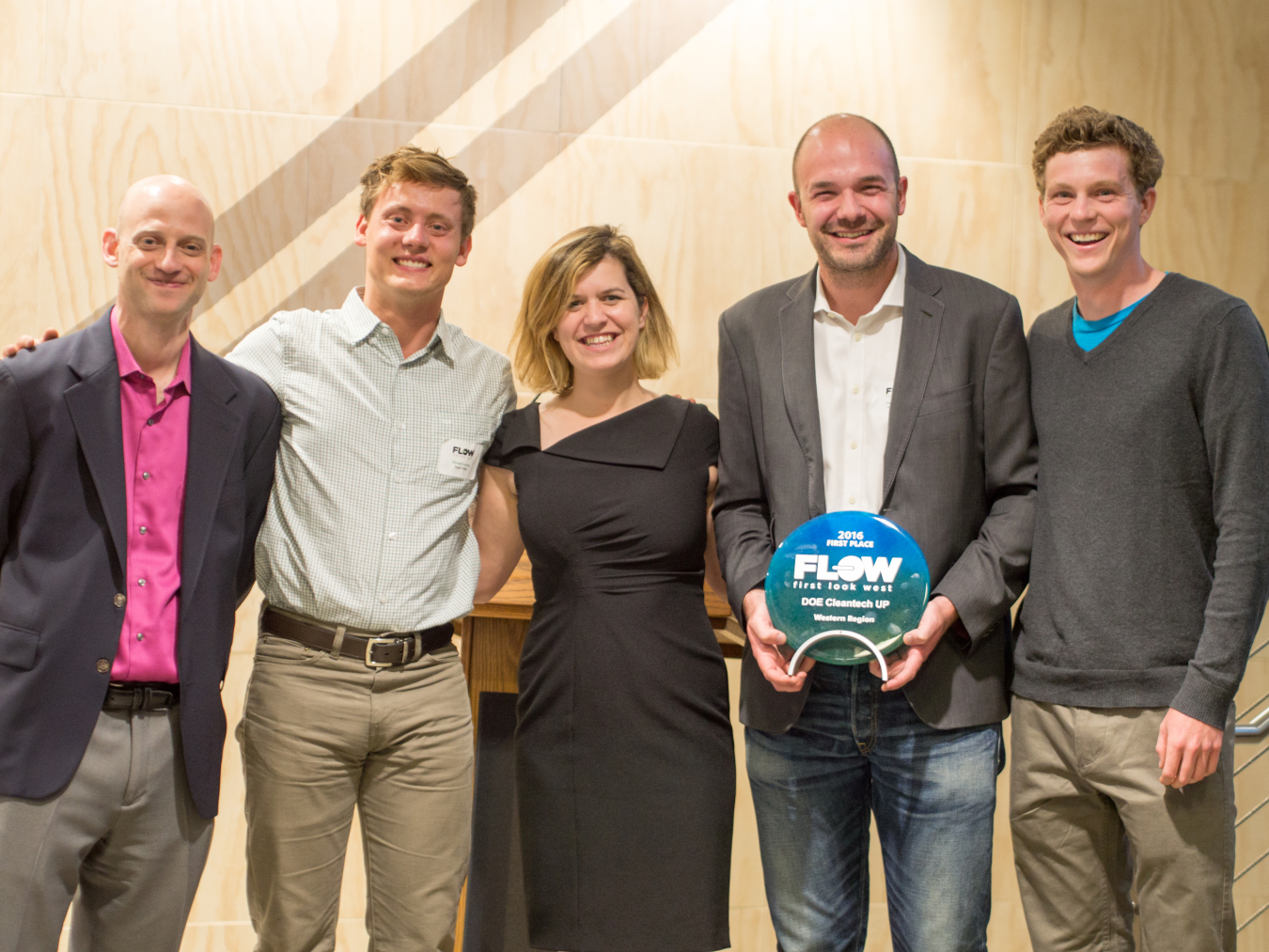The Energy Department’s Cleantech University Prize recently wrapped up its regional collegiate competitions. The California Institute of Technolo...
Office of Energy Efficiency & Renewable Energy
June 10, 2016
Hosts of the Cleantech University Prize (Cleantech Up) FLoW competition with the winners, Xstream Trucking of Stanford University. The team took home the $50,000 first-place prize for their drag-reducing trucking technology. | Photo courtesy of Caltech
Cleantech UP heads west
Caltech’s First Look West (FLoW) competition took place at the end of May at the school’s Pasadena campus. Xstream Trucking of Stanford University took home the Cleantech UP $50,000 first-place prize for its technology that eliminates the gap between a semi-trailer and its cab, thereby reducing drag and fuel consumption of trucks at high speeds. According to the team, trucking fleets’ biggest non-labor cost is fuel and two-thirds of a truck’s fuel is used to overcome aerodynamic drag. Xstream Trucking’s patented technology aims to improve fuel efficiency in the U.S. trucking industry, where 28 billion gallons of fuel were consumed by trucks in 2012, which made up 4% of the entire U.S. energy consumption.
Two teams, Akabotics of University of Hawaii and SkyCool of Stanford University tied as runners-up at Caltech’s FLoW competition. Akabotics is an autonomous robotic platform used to conduct continuous maintenance dredging on shallow waterways. SkyCool pitched the commercialization of a hyper-efficient air conditioning module that water-cools residential and commercial buildings. The modules generate water below air temperature and only require electricity to pump water through them.
All three teams are invited to the Cleantech UP National Competition later this month.

UCF's WIN Sensor demonstrated in an open environment. | Photo courtesy of UCF
Wrapping up in the Sunshine State
Cleantech UP headed to UCF’s Orlando campus the first week in June for the Megawatt Ventures competition. Sensatek Propulsion Technology, Inc., from UCF, took home first place and won the Cleantech UP $50,000 prize. Sensatek developed a Wireless In-Situ Nexus (WIN) Sensor that measures extreme temperature, pressure, and the strains of highly corrosive environments. The WIN Sensor helps optimize fuel cell operating conditions by dramatically reducing pressures, membrane degradation, and temperature distributions in real-time.
Grow Bioplastics from the University of Tennessee, Knoxville, and Capacitech, from the University of Central Florida, were named as runners-up at the Megawatt Ventures competition. All three winners are invited to the National Competition.
Grow Bioplastics’s project improves food sustainability by offering renewable, biodegradable plant containers and mulch films to gardeners and farmers. The containers remove oil based plastics from agricultural systems.
Capacitech has combined nanoscience with coaxial cables and supercapacitors to produce technology capable of being used in consumer electronics, energy production and storage, as well as for military or transportation use.
Now that Cleantech UP’s eight regional competitions are finished, next up is the National Competition, which will take place June 21-23 in Denver, Colorado. Three teams from each of the eight regional competitions will pitch their clean energy commercialization plans to the judges with $100,000 in prizes up for grabs.
- California Institute of Technology
- Carnegie Mellon University
- Clean Energy Trust
- Massachusetts Institute of Technology
- Rice University
- Rutgers
- The State University of New Jersey
- University of California-Berkeley
- University of Central Florida
Cleantech UP was built on the success of its precursor, the Energy Department's National Clean Energy Business Plan Competition (NCEBPC), which leveraged growing interest in energy entrepreneurship to expand student engagement in clean energy technologies. Launched in 2011, the NCEBPC has attracted more than 1000 teams, resulting in more than 120 ventures and generating $130 million in follow-on funding.
Jennifer Garson

Jennifer is the Director of the Water Power Technologies Office at the U.S. Department of Energy, where she leads the office’s strategy, management, and execution of the $150M office. The Water Power Technologies Office advances research, development and demonstration of hydropower and marine renewable energy. For the last three years, she has led some of the office’s key activities and initiatives—like the Powering the Blue Economy initiative—and a portfolio of prizes, interagency grants, among other programs. She has focused on increasing the impact of federal funding for supporting innovation, including leveraging nontraditional financial mechanisms. This includes increasing the utilization of prizes, creative lab-directed funding, SBIR/STTRs, and other competitive solicitations. Over the last decade, she has worked across DOE, the federal government, and in partnership with the private sector to launch and create new programs, prizes, and commercialization approaches for blue economy and cleantech technologies and applications.
Prior to the Water Office, she was the Chief of Staff for the Deputy Assistant Secretary for Renewable Power in the Office of Energy Efficiency and Renewable Energy. She was previously a Senior Advisor for the U.S. Department of Energy Office of Technology Transitions, focused on Department-wide strategies for increasing the use of prizes, challenges, and other open innovation tools. She also focused on catalyzing new networks and prizes to help entrepreneurs move their technologies from research institutions into the market in the Office of Energy Efficiency and Renewable Energy Technology to Market team. Her programs supported hundreds of startups across the country through novel training programs, competitions targeted at university students, challenges linking solutions to major corporate partners, supporting early-stage pilots helping validate companies' technologies, and creating new national and regional networks.
She served as a policy and market analyst in the Office of the Chief Financial Officer, developed analysis and provided technical assistance for the Office of Electricity Delivery and Energy Reliability on their smart grid portfolio during the Recovery Act, and served as a research assistant for a private consulting company.
Jennifer earned her B.A. in Anthropology and Environmental Studies Concentration at Kenyon College and her Master of Public Policy at George Washington University.
Articles by Jennifer Garson
-
 This National Hydropower Day, explore ways WPTO is helping build cleaner communities and making important contributions toward the United States’ goals of achieving a carbon-free electricity sector by 2035 and net-zero-emissions economy by 2050.
This National Hydropower Day, explore ways WPTO is helping build cleaner communities and making important contributions toward the United States’ goals of achieving a carbon-free electricity sector by 2035 and net-zero-emissions economy by 2050. -
 WPTO Director Jennifer Garson discusses WPTO’s investments in efforts led by industry, academia, and our national laboratories to advance our understanding and development of water power systems and technologies.
WPTO Director Jennifer Garson discusses WPTO’s investments in efforts led by industry, academia, and our national laboratories to advance our understanding and development of water power systems and technologies. -
 Water Power Technologies Office (WPTO) Director Jennifer Garson presents the 2020-2021 WPTO Accomplishments Report, which highlights achievements from WPTO-supported research across its Hydropower and Marine Energy programs.
Water Power Technologies Office (WPTO) Director Jennifer Garson presents the 2020-2021 WPTO Accomplishments Report, which highlights achievements from WPTO-supported research across its Hydropower and Marine Energy programs. -
WPTO is working harder to protect, understand, and leverage the immense power and promise of the ocean.
-
The Cleantech University Prize Collegiate Competition has traveled coast-to-coast over the past four months to find America’s next clean energy entrepreneurs. Meet the teams that will compete for $100,000 in prizes at the National Competition this we...
-
Energy Department competition supports student entrepreneurs and helps spur development of new clean energy technologies.
-
The Cleantech University Prize recently made two stops along the Interstate 95 corridor, with regional competitions in New Jersey and Boston. With just two regional competitions remaining, Cleantech UP teams are inching closer to the national competiti...
-
Forty-two companies with promising energy and other cutting-edge technologies collected more than $1.69 million at the 2016 Rice Business Plan Competition in Houston, Texas, capping an annual event billed as the world’s richest and largest graduate-l...
-
NovoMoto, a student-led startup from the University of Wisconsin-Madison, took home $50,000 after winning the Energy Department's Cleantech University Prize regional competition at the annual Clean Energy Trust Challenge in Chicago. NovoMoto's MicroPla...
-
The Energy Department's Cleantech University Prize competition traveled to the campus of Carnegie Mellon University in Pittsburgh for the first-eve...
-
Heating and air conditioning -- an $11 billion industry in America -- accounts for 5% of domestic energy use.

